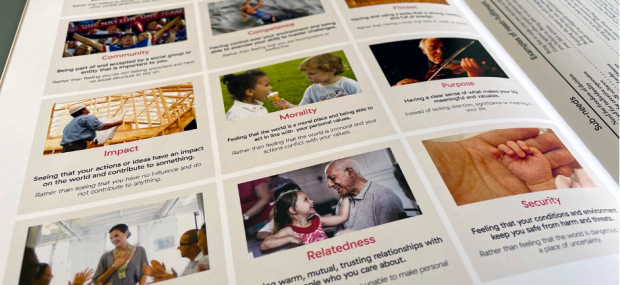Introduction
“Human needs specify innate psychological nutriments that are essential for ongoing psychological growth, integrity, and well-being” (Deci & Ryan, 2000, p. 229).
Although people may have different goals and wishes on the surface, deep down we all want the same things. Regardless of culture, age, and lifestyle, we ultimately share the same set of fundamental needs. Our needs are the basic requirements for our functioning, the nutrients for our development—and a vital source of meaning and happiness.
If one thing can be said about design, it is that its relevance to the individual and to humanity at large—its purpose, meaning, success or failure—depends on the extent to which it satisfies these needs. Products, services, buildings, systems, and all other human-made entities are essentially instruments for need satisfaction.

Typology of fundamental needs
Needs are the basic requirements for our functioning. People can only fully develop if all their basic needs are satisfied (at least to some degree), whether or not they are consciously valued, and none can be neglected without significant negative consequences. Human needs provide a solid fundament for positive experiences that are created and mediated through design and technology.
The typology of fundamental needs includes 13 psychological needs and 52 related sub-needs (four for each fundamental need). The typology was developed to provide a practical understanding of psychological needs as a resource for user-centered design practice and research with a focus on user experience and well-being. The typology can support communication with clients, within design teams, with end-users and other stakeholders. It can be used to operationalize the well-being impact of existing or new designs.
Typology development
The typology was developed by combining six existing typologies with the use of five requirements for fundamentals needs. A need is fundamental when it…
- Is universal, that is, it applies to all people, transcending cultural boundaries;
- is not derived from another need;
- leads to (physical or mental) well-being (that goes beyond momentary pleasure) when fulfilled, and to pathology (medical, psychological, or behaviour) when unsatisfied;
- motivates behaviour in a wide variety of situations (not only in specific circumstances);
- affects a broad a wide and diverse assortment of behaviours.
Availability
We believe in open-access research, so you can download the typology here:
The Need Typology is published under an Attribution-NonCommercial-NoDerivatives 4.0 International Creative Commons licence (CC BY-NC-ND 4.0). This means that you are free to share the Typology for non-commercial purposes as long as you give appropriate credit, provide a link to the license, and do not modify the original material. For licence details, see: https://creativecommons.org/licenses/by-nc-nd/4.0/.
Citation
Desmet, P.M.A., & Fokkinga, S.F. (2020). Beyond Maslow’s pyramid: Introducing a typology of thirteen fundamental needs for human-centered design. Multimodal Technologies and Interactions, 4(3), 38 (DOI mti4030038)
Additional tools and resources
House of Happiness Poster
The House of Happiness Poster is an inspiration poster. Each fundamental need is represented by an activity of a family in (and around) their home.
Reference: Desmet, P.M.A. & Fokkinga, S.F. (2021). House of Happiness: Inspiration Poster. Delft: Delft University of Technology.
Need Booklet
The need booklet provides an overview of the 13 fundamental needs and 52 related sub-needs (four for each fundamental need).
Reference: Desmet, P.M.A. & Fokkinga, S.F. (2020). Thirteen Fundamental Psychological Needs. Delft: Delft University of Technology. ISBN 978-94-6384-185-6.
13 chairs – 13 needs
Similar to the ‘house of happiness’ poster (see above), this is an inspiration poster. Each need is represented by a chair design.
Reference: Desmet, P.M.A. & Fokkinga, S.F. (2020). Thirteen chairs, thirteen fundamental needs: Inspiration poster. Delft: Delft University of Technology. ISBN: 978-94-6384-134-4
Alarm Clock Collection
“Wake Up and Smell the Coffee” is a set of 34 inspiration cards that portray conceptual alarm clock designs, based on the typology of 13 fundamental needs.
Reference: Desmet, P.M.A. (2025). Wake up and smell the coffee: 34 alarm clock designs to fulfill fundamental needs. Delft: Delft University of Technology. ISBN: 978-94-6518-023-6
Authors
The typology of fundamental needs was developed by Pieter Desmet and Steven Fokkinga.
Publication Date
First version was published in July 2020.
Contact
p.m.a.desmet@tudelft.nl
External website



